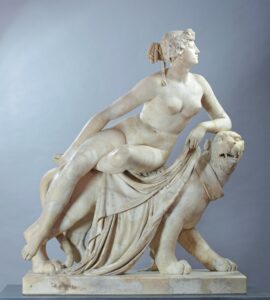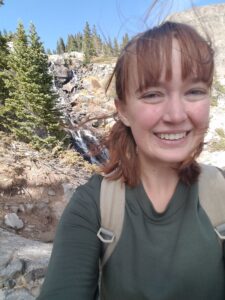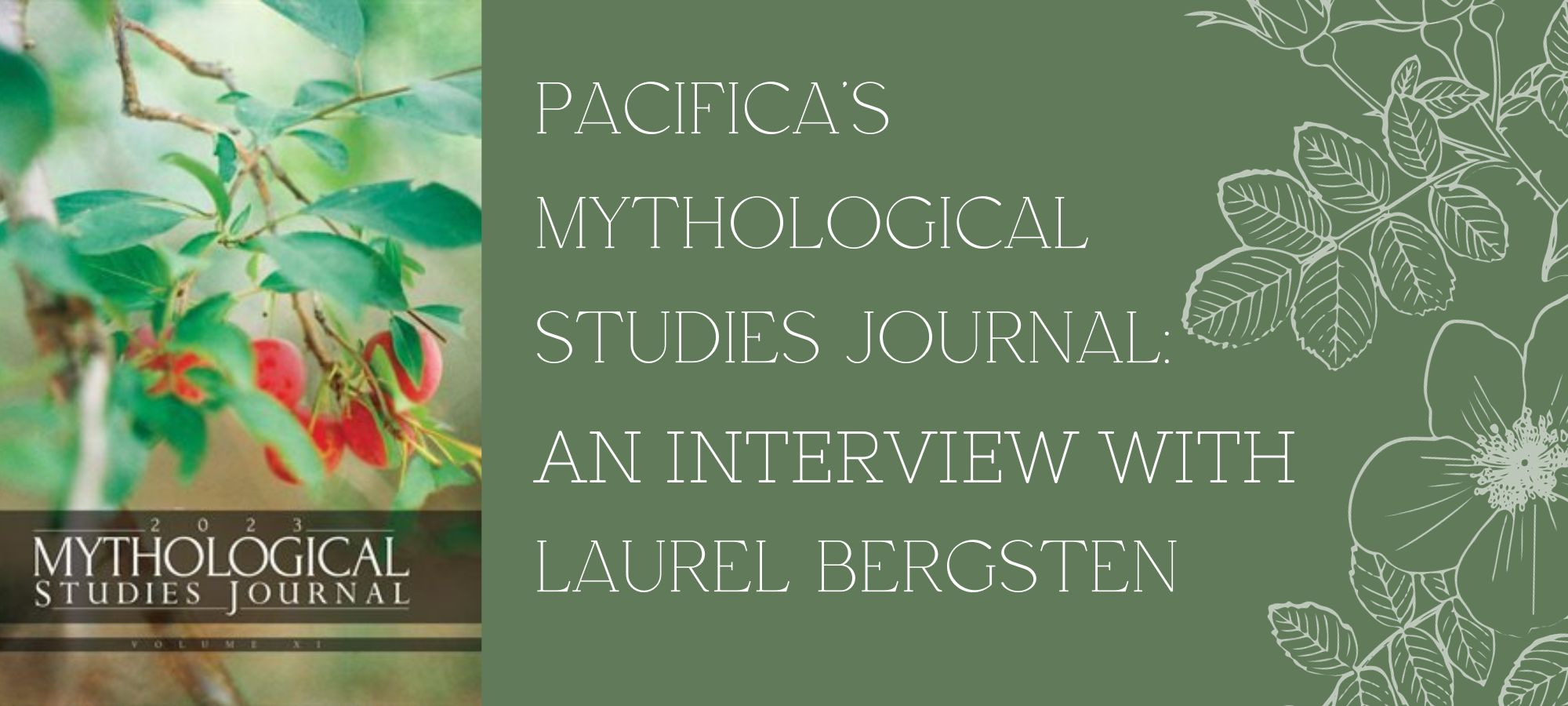Laurel Bergsten is a fourth-year Ph.D. student in our MA/Ph.D. Mythological Studies Program with a specialization in Depth Psychology, as well as being the Co-Senior-Editor of the 2023 Mythological Studies Journal (Volume XI), which is now available to read online and in print! MSJ is entirely student run and edited, featuring pieces by students enrolled in the MA/PhD Mythological Studies Program. You can read this issue now here. Or purchase it here.
Angela: You came to Pacifica with a professional background as a librarian and a Colorado Literacy Corps Service Member. Was that the link that led you to pursue your Ph.D. in the Mythological Studies Program at Pacifica, or was there something else attracting you here?
Laurel: I was a creative writing student as an undergraduate, and what really influenced me coming to Pacifica was the desire for a deeper academic education. I’d been looking for a Ph.D. program a long time, but none of the creative writing programs felt broad enough. I was looking for an interdisciplinary approach and when I found the mythology program, everything clicked. I’d been aiming to be a writer, but I knew that my career wouldn’t be a single path but more like a patchwork quilt. I’m interested not just in writing, but want to pursue teaching, coaching, publishing projects, running workshops, and artistic projects and production. I aim to have a lot of variety in my professional life.

Angela: Books are clearly important to you, and you run writing workshops for young people. Was editing the next obvious step in this chain and what in particular drew you to be co-Senior Editor of the Mythological Studies Journal?
Laurel: I’ve been an editor my entire academic career. I loved to edit for friends and in classroom workshop formats, and enjoyed a publishing internship during my undergrad. I was an associate editor on the 2022-23 team, and would have been happy to remain on the journal in a smaller role, but when the senior editor vacancy opened up, I was happy to step in. Being in charge of a project like this was new to me, but I was excited by some of the creative freedom that came with the position.
Angela: I understand that you’ve recently helped the journal go in a new direction. What was that direction and why the pivot?
Laurel: I think every editorial team will need a pivot of some sort to address the needs and desires of the current myth program. That means paying attention to what students want from the journal and how they interact with the journal. In this case, there was a call for more transparency, communication, and feedback. This year, we provided feedback on every single submission regardless of whether it was accepted and made every effort to keep lines of communication open when our final determinations were sent.
We tried to be transparent about why certain pieces were accepted. We were really focusing on pieces that we felt moved the study of mythology forward in new and exciting directions. We wanted pieces that elicited excitement from readers.
Angela: How did you go about forming a cohesive group of pieces? Is it like putting together a bouquet of flowers, you start with one and then see what you can add to it that fits?
Laurel: A bouquet is an apt metaphor. We were able to weed a few pieces out but had a lot of really beautiful submissions that were harder to let go of. Including all of them would have been beyond the scope of our team. Eventually Kira and I brought forward the pieces we wanted to champion. There were common themes among the pieces but no obvious unifying thread to follow. We knew cohesion would come later and would be organic. In the month leading to publication we finally sorted out a few groupings that we liked and built it up from there.
Angela: What are you most proud about in this issue of the journal?
Laurel: I’m proud of the numbers we got for submissions; we received a record-breaking thirty pieces. Twelve pieces may not sound like a lot, but when you’re taking them through multiple stages of editing and adapting to every author’s style of editing their own work, it’s a lot. I’m really grateful we were able to bring together a large enough editorial team to tackle this size of a journal. I’m also proud of the incredible diversity within the pieces.
Angela: You’ve contributed “The Priestess’ Shadow: Ariadne and the Minotaur” to the journal. Tell us about the paper and does it pertain to your dissertation work?
Laurel: I’ve worked with Ariadne archetypally for a long time. My piece details an initiating encounter with Man Ray’s photograph, Minotaur. The photograph transforms a woman’s body into the shape of a monster’s head. I recognized the archetypal Ariadne in the photograph and spent a few years writing and making art about her that focused on the sacrificed feminine that furthers the hero’s cause. When I found Pacifica, one of the things that contributed to my excitement about attending here was the opportunity to deepen my understanding of Ariadne’s story.
My dissertation focus is actually on Aphrodite, and the ways her archetype expands our relationship to the physical world. However, Ariadne had a huge role in leading me to Aphrodite. It was in researching for “The Priestess’ Shadow,” that I began to understand a kinship between the two figures. Eventually it became clear that developing a relationship to the Aphrodite archetype would be as fruitful as my journey with Ariadne.
Angela: What is your favorite part about being in the Mythological Studies Program in Pacifica?
Laurel: That’s a fun question. I love the breadth of study that we are introduced to. We have classes that focus on ecology, philosophy, and archetypal and Jungian psychology. It was such a gift to be able to explore all of those areas within the same program. I was looking for a broad study because I have broad interests. Seeing other student’s specific interests and their different epistemologies enriched my learning beyond my expectations of the program.
Angela: Thank you so much for your work on the journal and for sharing your experiences at Pacifica with me. I look forward to seeing your dissertation!

Laurel Bergsten is a multipassionate student, writer, artist, and library worker residing in Colorado Springs. She is a PhD candidate at Pacifica Graduate Institute in the Mythology and Depth Psychology program.

Angela Borda is a writer for Pacifica Graduate Institute, as well as the editor of the Santa Barbara Literary Journal. Her work has been published in Food & Home, Peregrine, Hurricanes & Swan Songs, Delirium Corridor, Still Arts Quarterly, Danse Macabre, and is forthcoming in The Tertiary Lodger and Running Wild Anthology of Stories, Vol. 5.


